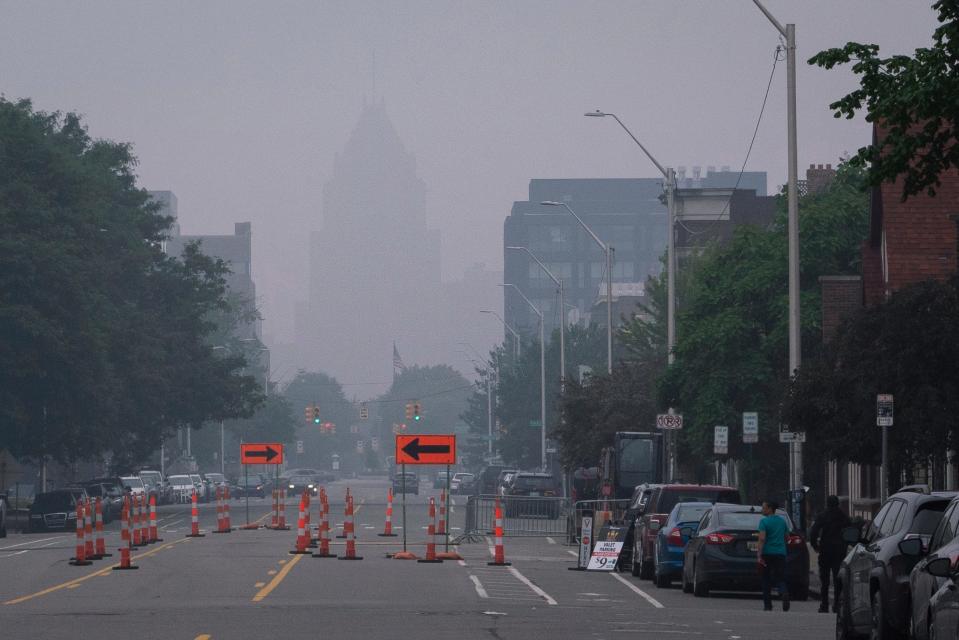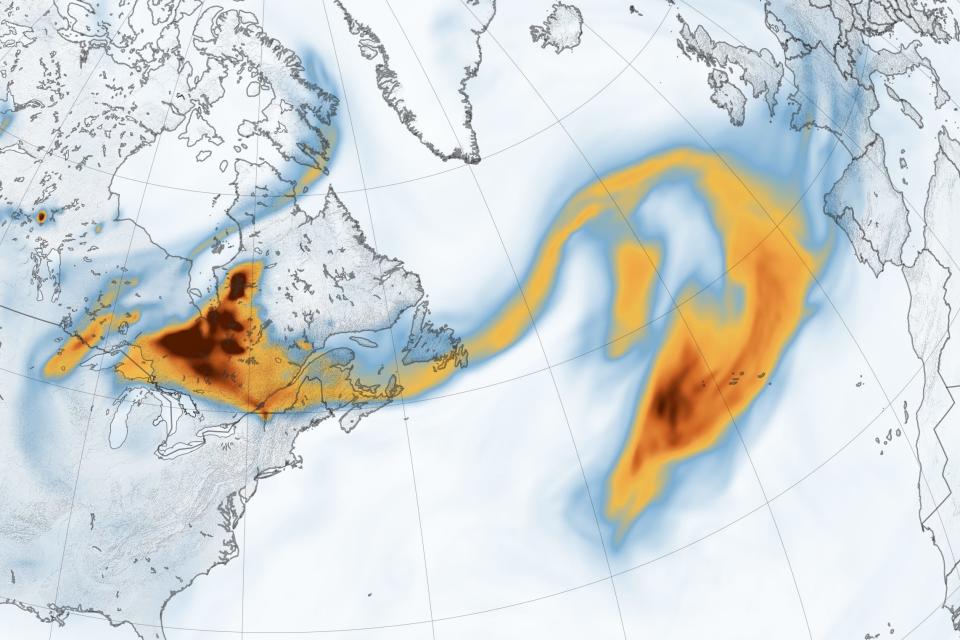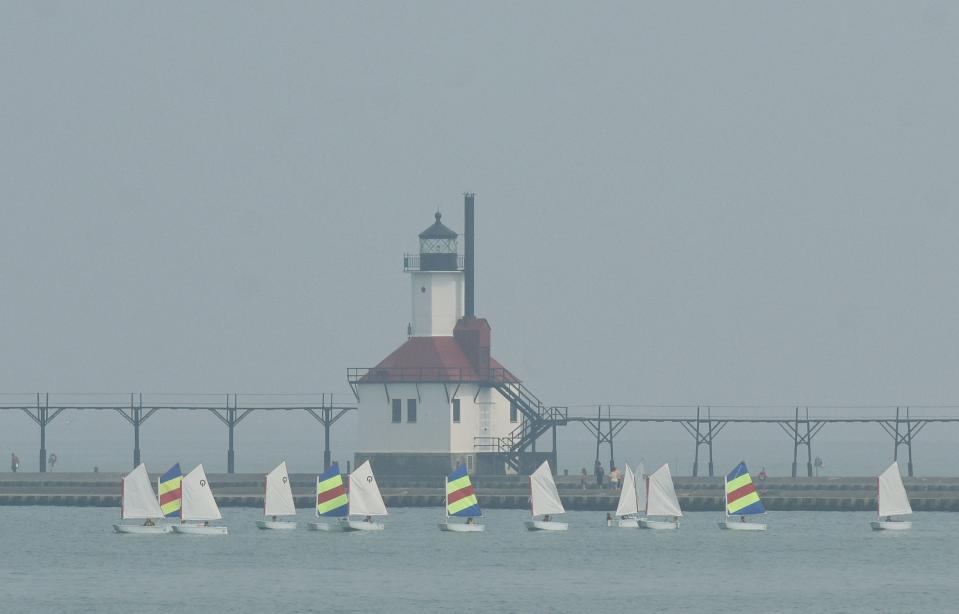Detroit air quality alert extended through Thursday with more wildfire smoke expected
The air quality alert issued was extended through Thursday for Michigan as weather forecasters expected low-level winds to change direction, potentially resulting in more smoke and reduced visibility as a result of the Canadian wildfires.
"Things are going to improve," National Weather Service meteorologist Steve Freitag said Wednesday afternoon. "Unfortunately, tonight, our winds are going to flip back to the south, southeast direction and that's going to bring back more smoke."
Warnings will persist, he said, for groups sensitive to pollution — especially older adults with chronic heart or lung disease, children and asthmatics — may be risking their health if they spend much time outdoors.
Dr. Glen Clark, the Emergency Center Chief at Corewell Health’s Beaumont Hospital in Grosse Pointe, said they've seen an increase in respiratory issues in recent days due to the poor air quality.
“In the last week, we have seen a significant increase in respiratory complaints," Clark said in a statement to the Free Press. "We’ve seen both asthma and COPD patients, who have been well controlled, presenting with exacerbations requiring an increase in use of asthma medications, including rescue inhalers. Even otherwise healthy individuals have come in complaining of chest tightness.”
Dr. Jaime Hope, medical director of Emergency Medicine at Beaumont Outpatient Campus in Livonia said the air quality can be detrimental, especially to those with preexisting health conditions.
"The poor air quality can make it harder to breathe, trigger an asthma or emphysema attack, or allergies," said Hope in a statement. "Difficulty breathing can also cause increased strain for patients with cardiovascular disease. It is important to pay attention to air quality alerts and warnings and limit outdoor activities as much as possible when alert levels are elevated."
Throughout Tuesday night and into early Wednesday morning, Detroit and Chicago, alternately flip-flopped as the world's worst major city for pollution, according to rankings by IQAir, a Swiss company that monitors worldwide air quality.
Detroit air quality is bad: How to prevent getting sick from Canadian wildfire smoke
The haze prompted the cancellation of minor league baseball games Tuesday on the west side of the state.
Closer to home, Detroit Mayor Mike Duggan still met Wednesday with President Joe Biden's adviser Gene Sperling and other local and federal officials to unveil a redesigned Roosevelt Park, but a public celebration that had been scheduled afterward was canceled because of the air quality alert.

Detroit City FC moved its game Wednesday against Cleveland Force SC from Hamtramck to Legacy Center Sports Complex in Brighton, which is indoors. The Red Wings moved their 2023 NHL draft watch party from Chevrolet Plaza to inside Little Caesars Arena.
And Rochester Hills postponed its annual Festival of the Hills fireworks show because of the poor air quality.
Canadian forests have been burning since May in what some experts say may turn out to be the worst-ever year of wildfire destruction for America's northern neighbor, and that is sending the clouds of smoke — filled with tiny, dangerous particulates, much smaller than the width of a human hair — toward Michigan.
The smoke is so bad, NASA reported a satellite from Monday showed it drifting more than 2,000 miles across the Atlantic to Europe, blowing over northern Portugal and Spain.

Moreover, as millions of Americans and Canadians experience hazy skies and breathe in dangerous air that smells and tastes like an ashtray, meteorologists and climate experts say this may be a good time to consider how human behaviors are influencing extreme weather.
And, state toxicologists said, the longer the smoke lingers, the more likely it is to smell more artificial, or like burned plastic, as ultraviolet sunlight tends to break down the organic compounds in the air and release chemicals.
Meteorologists with the state's Department of Environment, Great Lakes, and Energy, which issues the state's air quality alerts, said they also are continuing to watch weather patterns and assess air quality, and will announce additional alerts if necessary.
More: Canadian wildfires are sending smoke to Europe, but it is only sometimes hitting Michigan
More: July's full moon is almost here: What to know about the unique occurrence
The air quality rankings frequently fluctuate, changing minute-by-minute, and use a 0-500, color-coded scale.
Air quality index values between 151 and 200 — which is where Detroit has been lingering — are in the red zone, with outside conditions that are considered unhealthy. At times, Detroit has been pushing into the next worse alert category, very unhealthy — or purple — with a score of 201 to 300.
If the index score goes above 301 — maroon on the chart — the air is considered toxic, hazardous to everyone.
By about 7 a.m., IQAir ranked Detroit at No. 2 — below Dubai, United Arab Emirates — with an index score of 235, very unhealthy air. The other major American cities at the top of the list were Chicago at No. 3, Minneapolis at No. 6, Washington D.C. at No. 13 and New York at No. 35.
By about 2 p.m., however, Detroit's score had fallen to 179, which is still unhealthy.
Dubai, which one of the fast-growing cities in the world, faces air pollution from construction, industrial activity, vehicle emissions and dust storms. Moreover, the city's extreme heat doesn't help because it tends to trap pollutants in the air.
In addition to the air quality scale, scientists look at particulate matter — a mix of solids and aerosol — in the air.
The tiny particles are measured in microns. To get a sense of how small a micron is, consider this: A strand of hair is 50 to 70 microns. Dangerous air is filled with particles 10 microns and smaller, which you are breathing into your lungs and they are triggering health problems.
Particles that are 2.5 microns or less are especially dangerous because they are more difficult to filter, with some passing through even close-fitting face masks.
Still, climate scientists say there may be an upside to the hazy skies across America in recent weeks: It could be a chance to discuss human-caused environmental challenges, such as more extreme weather which appears to be leading to more severe droughts, which are causing wildfires.

The Yale University's Program on Climate Change Communication, which aims to educate the public about climate change, has said that "global warming is one of the greatest threats — and opportunities — of the 21st century."
"The scientific nature and intense political polarization of the issue inhibits many people from discussing it with family and friends for fear of conflict or getting the details wrong," the program noted in a report. "Yet, social science demonstrates that talking about the issue of climate change as well as understanding its causes is key to raising awareness and building support for climate action."
Contact Frank Witsil: 313-222-5022 or fwitsil@freepress.com.
This article originally appeared on Detroit Free Press: Detroit air quality alert extended through Thursday amid wildfires

